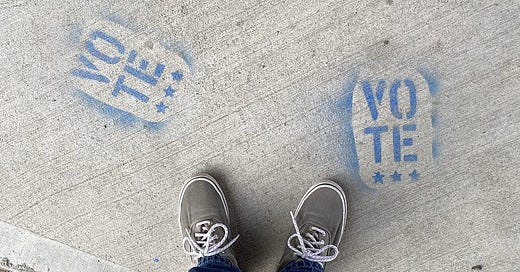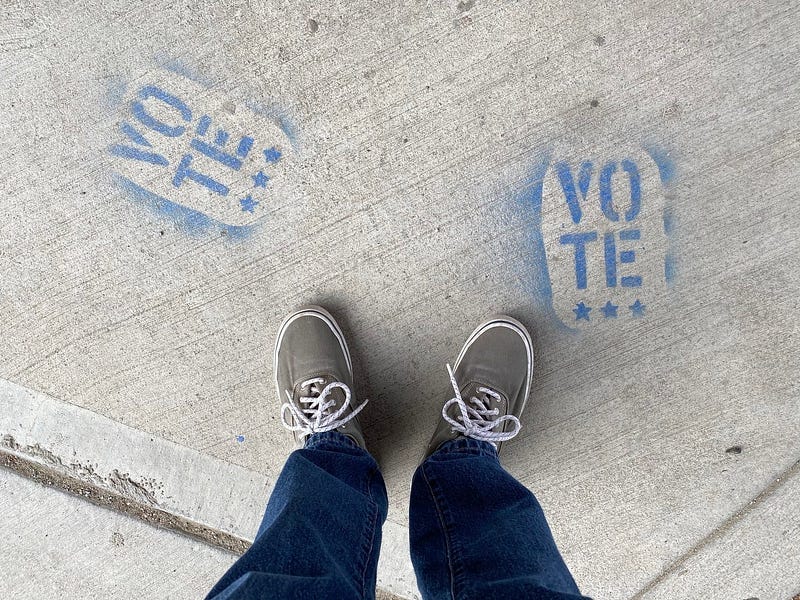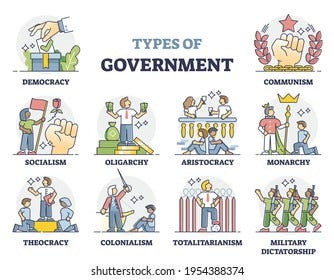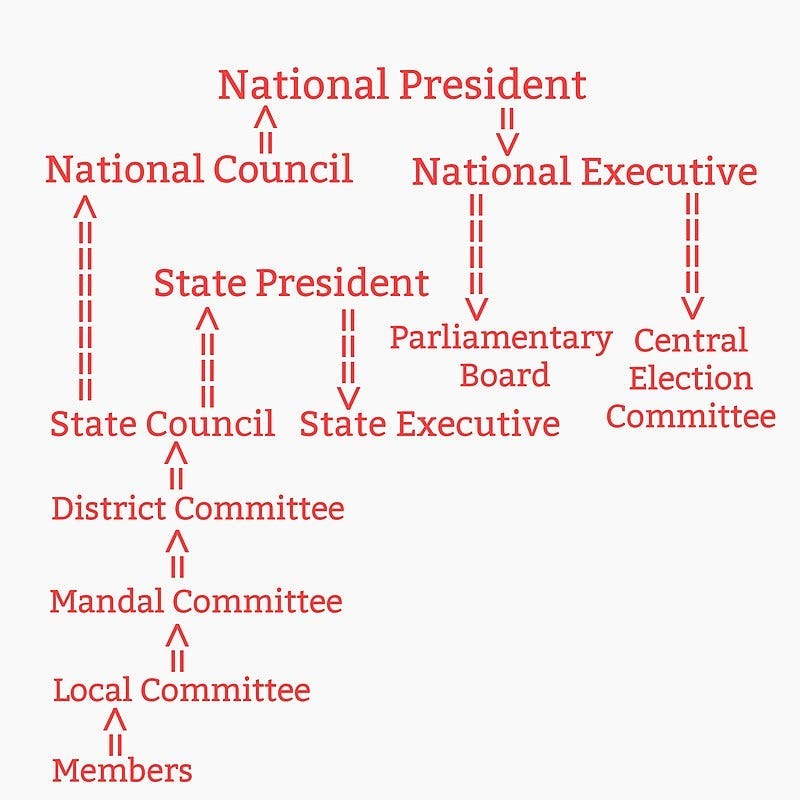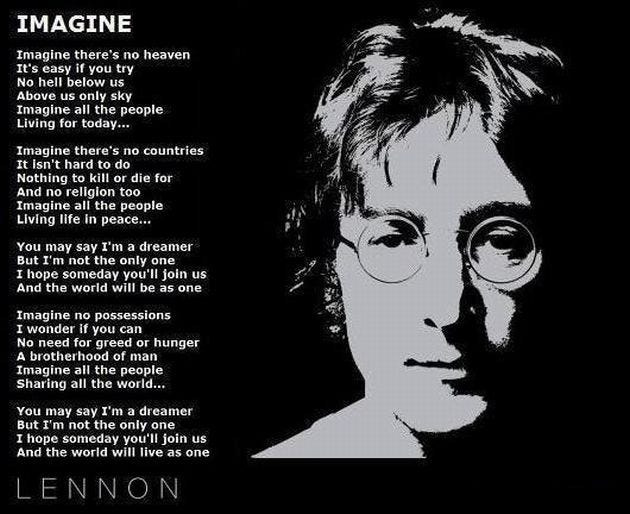Is Democracy Failing Worldwide In The 21st Century?
A look at democracy in the 21st century, a bit of a debate about India and some solutions that were inspired by John Lennon \m/
(Note: Before you read this article, please know that I’m not at all politically inclined or aware of much about politics and many political terms and systems, I’m just a musician, entrepreneur, and football journalist, so my expertise in this subject is limited. It’s also not the best-written article, because again, I’m not an expert in politics. I don’t support any political party and never vote. I’m just starting to read more about the subject, and this is just my different perspective which might seem a bit radical but is based on my notions and views of what could work when it comes to governance based on the past, present, and future.)
Democracy was hailed as the future and the rightful passage forward for society and the ideal form of governance ever since its ideological inception. It was heralded as the government ‘for the people’ and ‘by the people’ but as it has panned out, it has created more disparity and lower equality, and greater dissatisfaction amongst the public.
In the 21st century, democracy is giving way to a rise of an authoritarian political culture, and citizens who are more malcontent and increasingly cognizant of their leaders working to preserve their own power rather than promoting the common good.
Democracy can be considered as failing worldwide in the 21st century because we do not have many fully functioning democracies anymore, and moreover, democracy is failing because we cannot agree on what it means and how it should be implemented or used.
It’s still considered a democracy because people can vote for their representatives, who then govern the country on their behalf, but that is increasingly becoming a ploy and catchphrase used by politicians to suppress the public and execute their own agenda.
In an article by The Times Of India, recently in 2021, it read:
According to a new survey conducted by Pew Research, across 34 countries, a median of 52% were found to be dissatisfied with democracy and approximately 64% feel that the elected representatives do not care about the people.
While an article in The Wire, also this year, read:
The effect of unchecked neoliberalism is painfully evident in India, where the state has over the decades turned its back on its most fundamental responsibilities. Its economy has grown by leaps and bounds but the gains haven’t been shared all round. The top 0.1% of earners have captured more growth in income than the bottom 50% combined. Rather than creating equalising life opportunities to reduce inequality through substantial investments in health, education, environment and infrastructure, the state has allowed basic citizen rights to be mediated through the market. That has only resulted in entrenching and reproducing the country’s historical inequities…..
As India has grown to be one of the most unequal countries in the world since the economic liberalisation in the 1990s….There’s much to fix, with the richest 1% owning more than four times the total wealth held by the bottom 70% of the population.
I’ve touched on a bit of neoliberalism and neoliberalist policies in an article I wrote on my blog about the IMF and World Bank in 2016 of which this an excerpt, looking back at how it unfolded some 20 years ago:
As John Gershman and Alec Irwin state at the turn of the millennium in the 2000s:
“100 countries have undergone grave economic decline over the past three decades. Per capita income in these 100 countries is now lower than it was 10, 15, 20, or in some cases even 30 years ago. In Africa, the average household consumes 20 percent less today than it did 25 years ago. Worldwide, more than 1 billion people saw their real incomes fall during the period 1980–1993. Meanwhile, according to the United Nations Development Program’s 1998 Human Development Report, the 15 richest people in the world enjoy combined assets that exceed the total annual gross domestic product of sub-Saharan Africa. At the end of the 1990s, the wealth of the three richest individuals on earth surpassed the combined annual GDP of the 48 least developed countries.”
The disparity has grown further over the past decade and a half and now the world’s poor people in developed and developing countries alike control less than 10% of their income as per a report by the world economic forum.
In the United States, income inequality, or the gap between the rich and everyone else, has been growing markedly, by every major statistical measure, for some 30 years. Income disparities have become so pronounced that America’s top 10 percent now average nearly nine times as much income as the bottom 90 percent. Americans in the top 1 percent tower stunningly higher. They average over 38 times more income than the bottom 90 percent. But that gap pales in comparison to the divide between the nation’s top 0.1 percent and everyone else. Americans at this lofty level are taking in over 184 times the income of the bottom 90 percent.
So ultra-capitalism and neoliberalism masquerading under the veil of democracy are here to stay, or it seems so at the moment at least.
It’s clear that democracy is failing and is highly flawed, unjust, unequal, and dishonorable. These are the glaring signs of a failing government and if a government fails, democracy fails.
In the end, it’s the people who have to endure and suffer.
So what can we do?
Here are some solutions…..
A Viable Solution: A De-Centralized Government Elected By The People
The most radical answer that my sister(who is a liberal arts graduate and is more politically aware and inclined) and I came up with as I had this debate with her was of a de-centralized government that is elected by the people.
How it will work, as we theorized it, was that every district (or taluka as it is called in India) or every village in an undeveloped area or neighbourhood in a city, elects a small committee; much like a co-operative society or co-operative enterprise(as is prevalent in India), and then, each district committee formulates policy within itself and governs that district independently.
The committee will make policy and govern the district, area, or neighborhood, taking each of every resident’s opinions and inputs in sort of a mini-neighborhood parliament; in a monthly meeting and will work to improve the lives of each individual living within the neighbourhood.
They will not report to any central or state government and will distribute wealth equally within the neighbourhood. Apart from this, they will work to ensure the highest standards of living, promote enterprise, education, equality, and just governance.
It’s a sort of cooperative that is self-sufficient, self-governed, and is a mini-state if you will, within each district of a city.
Each district will be self-governed and free from the clutches of the centralized machine.
When it comes to taxation, it can be reformed to let the committee collect enough from their own district to promote and improve the lives of each person that lives in that district.
So the money goes straight back into promoting the development and progress of each district.
It’s also elected directly by the people and not an electoral college elected by the people, as is the case with current modern democracy which is actually farcical and flawed on many levels.
When it comes to enterprise and business, every top company’s management can contribute to the district they live in or choose.
It’s sort of like self-sustained townships like Auroville which is in Pondicherry, Tamil Nadu, India which started off as a thought experiment, by Sri Aurobindo and the Mother.
They have their own policies and ideals like being yoga-centric and embodying other spiritual and cultural practices and policies but that’s the kind of freedom I’m talking about, each district or township can have its own way of governance, and policies and ideologies which are their own.
When it comes to citizenship, it’s no longer needed and there’s freedom of movement.
People can have the freedom of movement and choose which district they want to live in, anywhere in the world. Basically, if you identify with the ideals and the governance of a particular district, anywhere in the world, you can freely move there and live without worry.
Auroville sees hundreds of foreigners, primarily European, migrate to and live and work within the township to join the Indians there.
However, the current Indian BJP government is trying to take over Auroville as is mentioned in this article in the Deccan Chronicle.
This idea is a bit utopian, although not much, but it’s the most sensible one we could think of after debating for an hour and a half.
What Can We Do For The Moment? A Look At India — Are Dynastic Parties Better Than Those That Aren’t?
So what can we do with the cards that are dealt for the moment? i.e. considering the current form of democracy is here to stay?
What kind of structure of a political party that governs a state is an ideal structure that is best equipped to serve the people and benefit people and the state considering the current climate?
This debate is about the ideal structure of a political party within a democracy taking the prime example of India.
In India, the three largest political parties are the BJP, the Indian National Congress, and perhaps the Shiv Sena.
While the ideologies and the policies of each of these parties are for another day, this debate is purely based on the structure of the party that is best suited to benefit the people of the state in the long term.
All parties are, in the end, elected by the people of India (although the common man rarely benefits from it) i.e. it’s mooted as a democracy regardless.
But, it’s via an electoral college. So again, it’s a deeply flawed system of electing a government.
However, here is a different perspective about what is better suited for the progress of the country, comparing a dynastic party to one that’s not.
Structure
The Congress and Shiv Sena are by and large controlled by families, namely the Gandhi family and the Thackerays. Both parties have other leaders and members of course, but the majority of the power and decision-making, in the end, boils down to these families. Both parties are dynastic in design.
The BJP on the other hand is more organizationally structured and diverse and comprises several elected leaders all at more or less equal levels of power and rank. They aren’t a family. But they’re more hierarchical and like an organization.
A Look At History
Looking back through history, the history of the world has seen governance by aristocracies, monarchies, and later oligarchies as things unfolded.
For as long as humanity has existed, from ancient Greece or ancient Rome, or ancient India, or Britain, the world has primarily seen kings and queens and nobles govern the rest of the population, for centuries.
All these forms of government were primarily dynastic and family-centric with only slight involvement from others like the Greek or Roman senate working under their king. The wielding of power and policy stayed with the rulers.
Even in the 19th and 20th centuries, the leadership of smaller gangs that sprung up all over America, right from the 19th century into the prohibition era managed by gangsters like Al Capone, Nucky Johnson, Lucky Luciano, Arnold Rothstein, and Meyer Lansky were also family-centric and family-oriented. (You can have a read of my previous article about The History Of The Five Points In New York)
A single family or smaller unit controlling a broader state or outfit or enterprise simply worked better.
When it comes to movies and TV shows, think The Godfather or The Sopranos, or Boardwalk Empire or Peaky Blinders.
They do what they do for themselves and their family. Irrespective of whether it’s crime or illegal.
Although in the 21st century, as we head at supersonic speed into the exciting technology-driven future, the question of whether if it’s still relevant or useful to learn from the past anymore?
It still exists in England, but I’m not sure of how involved the royal family are in governing the country.
But, the question is if it worked for mankind for those many years, there could surely be some plausible reasoning behind it, right?
It seems like an outdated and absolutely ridiculous and absurd system of governance in this day and age, but is there something we can learn or take away from it, which is that ‘smaller groups can control and manage larger ones better.’
This is why the de-centralized system I explained earlier is ideal.
Despite democracy being constructed as it is, in the end, the power is still with the top 1%.
Will it change in the immediate future? It’s definitely unlikely.
A Dynastic Party Like The Congress vs A Non-Dynastic Party Like The BJP
This leads to the argument of whether a dynastic party like the Congress or Shiv Sena is a better bet and better for the people of a country when it comes to governing a country like India rather than a party like the BJP.
In a way, a party like the BJP that is structured like an organization is also managed and directed by a close-knit group of party members, so, it’s not that different from a dynastic party.
Sure, it has more members that are treated equally and might seem like a party that is more equal and fair in its structure and that has more members in control, but there’s still the PM and his closely knit cabinet and advisors who call the shots.
One Family vs Every Family When It Comes To Corruption: The Two Sides Of The Coin
The Congress and Shiv Sena are governed and controlled primarily by one family respectively, and so they will look at taking care of and accumulating more wealth for their family first, before helping the collective i.e. ushering progress, taking care of and formulating policies that benefit the people of the country.
While this might seem like a gaping flaw and dirty politics and in the eyes of the masses; something that is very selfishly structured, and also wrong, dishonorable, and on many levels, unjust, it’s actually basic human behavior.
It’s a natural human tendency and behavior to take care of your family first before your larger purpose or line of work. It’s obvious that any adult human being will look at the economical benefit of his/her family before the economical benefit of the state. Looking out for the benefit, welfare, prosperity, health, and continuity of your family is every human being’s deeply rooted ideology.
The BJP on the other hand consists of five hundred such families, not just one, that are calling the shots. So all five hundred families will look to do the same thing as above when it comes to strengthening their families and power; which in turn, leads to higher corruption.
Corruption is rampant in Indian politics more so than anywhere else in the world. So when it comes to corruption, there are two sides of the coin.
One way of looking at it is:
Is a dynastic party going to have lesser corruption because it’s dynastic? A plausible answer is that the family that controls the party can issue internal policies to ensure that the rest of their party members are less corrupt. So it is possible that a dynastic party could ensure lesser corruption. This could mean more money is available to ensure the economic benefit and welfare for the people of the state.
While in a party like the BJP, where all members are more or less equal in rank, every member within the party will look to take care of and look at the monetary benefit of their families and are more susceptible to bribes and under the table dealings, which means more corruption and lesser money for the state and lesser going into the economic benefit of the country.
Being highly capitalist and having more members looking at fattening their pockets and bank balances, accruing more wealth for themselves and their families, will lead to policies that are more inclined to serve the party members rather than the country.
Policies such as higher taxation(for example the GST) and policies that will drain out more cash from the state economy transferring wealth from the people to the pockets of these five hundred families is more likely to happen in an organizationally structured party that is non-dynastic that is governing the state.
So the question is when it comes to corruption, is it theoretically better to have just one family vs every family looking at selfish benefits over public service and governing the state?
It’s definitely a valid argument and one way of looking at it.
However, on the other side of the coin, a dynastic party like the Congress or Shiv Sena could also lead to more corruption than an organizational structured party like the BJP.
If gone unchecked, it could mean that not only does the family that governs the party accrue more wealth, and take care of their interests, but they could also let their other party members continue to fatten their bank balances to an increasing extent and it could lead to considerably more corruption, i.e. the family raking in the majority and bulk of the cash and the party members joining in at the same level as an organizationally structured party like the BJP.
Corruption could be much more rampant with a dynastic party as well.
So it’s a really tough call that is presented to the people. Who can you bank on?
The Law Of Diminishing Marginal Utility And Can It Be Applied To Members Of Political Parties?
There’s a term in economics called ‘The Law Of Diminishing Marginal Utility.’
As defined by Investopedia:
“The law of diminishing marginal utility states that all else equal, as consumption increases, the marginal utility derived from each additional unit declines.”
In terms of human psychology, it can be applied by saying that the more you have of something, the lesser your need for it is.
It further suggests that the satisfaction level of something decreases the more you have of it.
Can this law be applied to money? Yes, it can.
This is called The Marginal Utility Of Income.
It’s defined by Investopedia as:
“The marginal utility of income is the change in utility, or satisfaction, resulting from a change in an individual’s income. Marginal utility is diminishing in nature; in general, as income increases, individuals gain a correspondingly smaller increase in satisfaction.”
So technically, the more money you make and the higher your income increases, the less satisfaction you feel and the less you want.
It’s definitely relative from person to person. Will you be satisfied once you hit your monetary goals? Or will you want more and more? A question that can be applied is “Who is ever going to say no to more money?”
So can the law of diminishing marginal utility of income hold good when it comes to the leaders and members of political parties?
Alternatively, if it comes back to the dynastic party debate, a way of looking at it is that the family that controls the political party could eventually have enough income and at some stage adhere to the law of diminishing marginal utility of income. Sort of like the Congress at the moment.
They could say, “Ok, we’ve made enough for the family, now let’s focus on the state”
This could benefit the state hugely and significantly change how a party governs the state. From policies to their implementation and creating a better standard of living, improving welfare, education, infrastructure, and ushering progress for the state.
If the law of diminishing marginal utility of income satisfies political leaders, especially the controlling family of a dynastic party, there could be considerably less corruption and more progress.
In a party that is not dynastic, this same law could be applied to very few members, i.e perhaps only the PM and a few cabinet members at the highest level of governance. But they could still look at making the buck.
This could be a viable argument. But again, this could happen in the Congress as well unless they’re satisfied.
So this is of course very equivocal and relative from person to person.
At the end of the day, it becomes a moral, situational, and personal aspect of human behavior that depends on how content a politician is with his wealth.
Management & Governance And How Democracy Fails When It Comes To Policy And Decisions
There’s the Parliament like it is worldwide, or the Lok Sabha as it’s called in India, where there’s voting for the passing of bills. Where there’s a convening of all elected members and the collective decision-making of state policy.
And so in decision and policymaking, there is more chaos and conflict and it takes a longer time to resolve issues and create policies with multiple ideas, multiple inputs, and separate votes from a larger number of members of various parties who oppose each other and are only looking out for their benefit.
Policies created by parliament are directly beneficial to party members and rarely for the people.
The people never get to voice their opinions and ideas and take part in any kind of policy formulation and all if not most of the policies formulated by the parliament benefit their members directly and not the people at all.
The distribution of wealth is unequal and skewed and the people are left with just adjusting and dealing with whatever policy is made by the government.
Is It Time For Change?
In the end, democracy has failed. It was conceived with the best reforming intentions at the time, but it’s going nowhere except straight to the banks of the top 1%.
We’ve tried democracy out but it’s clearly not working. It’s leading to more problems and lesser solutions. It’s tried and tested and failed.
We need a more peaceful, elegant, equal, and less agenda-driven way of governance that is going to propel humanity into the far reaches of the future especially with the rate at which technology is evolving.
A decentralized structure of governance could be something that is unique, peaceful, beneficial, not corrupt, equal, and ideal for society and the world.
It could be deemed as a bit idealistic but if we can decentralize money like with cryptocurrency there might be hope for a decentralized form of government as well.
Can the world break the shackles of this failing system of government that is prevalent worldwide and bring in something new that promotes equality and welfare?
The world takes its natural course as time moves forward, and only time will tell as to what course it takes, but to end this post I’ll just leave some lyrics by John Lennon from ‘Imagine’ that I’m sure you know…..

